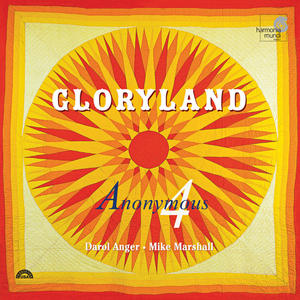 Gloryland is Anonymous 4’s second foray into traditional Anglo-American music, and with their usual scholarship and insight, they’ve brought out a near-perfect collection. The material is focused on imagery of the journey, and the presentation is arresting.
Gloryland is Anonymous 4’s second foray into traditional Anglo-American music, and with their usual scholarship and insight, they’ve brought out a near-perfect collection. The material is focused on imagery of the journey, and the presentation is arresting.
There’s not really much that can be said about this album; Marsha Genensky covers most of it in her usual scholarly and eminently readable essay, but it is worth noting that the songs all come from nineteenth-century sources, many of them found in early “shape note” notation, in which the four main tones each have a different shape for the ease of those performers who didn’t read standard musical notation. (Some of the selections are from later seven-tone shape note tunebooks.) The songs themselves exhibit the fluid nature of folk and vernacular material: as Genensky notes, sacred words might be sung to a dance tune, and hymns might be sung to a tune different from the one we are used to, while the same tune may fit different words. The selections illustrate this tendency, and the presentations follow traditional singing styles closely. Three of the songs (“I’m On My Journey Home,” “Ecstasy,” and “Saint’s Delight”) are sung in traditional three-part harmony as they were recorded in the shape-note tunebooks of the nineteenth century; two gospel songs, “The Shining Shore” and “Where We’ll Never Grow Old,” are sung in their original settings. The remainder have been newly arranged by Anonymous 4, but their understanding of the material is such that one is hard put to tell which is which just from listening.
I have to say that I found this disc not only arresting, but evocative: these are songs mainly from the American South, and if I don’t necessarily recognize the songs themselves (it’s been a long time), I remember the ways of singing them from my childhood. My only complaint is the repetition of the tune known as “Wayfaring Stranger” at various places throughout the disc, which gives a good example of the different guises under which a tune can appear, but also makes the collection somewhat repetitive. Otherwise, the album really can’t be faulted, particularly with regard to the musicianship of the performers.
Anonymous 4 is Marsha Genensky, Susan Hellauer, Jacqueline Horner, and Johanna Maria Rose, joined on this collection by instrumentalists Darol Anger and Mike Marshall
(Harmonia Mundi, 2006)
